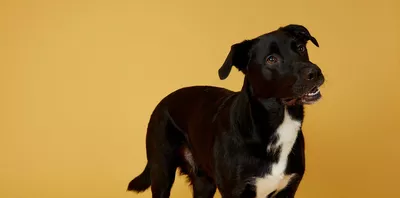How to Become a Dog Trainer
- 09 Aug 2023
- 15m read

Advice from our very own Butternut Box Ambassador, Meera. Meera is an IMDT qualified Dog Trainer specialising in puppy training and socialisation, across the Sheffield area.
A Bit About Me
By day I’m a puppy training specialist, and the very proud owner of Meera Puppins puppy training, in Sheffield, Yorkshire. I’m also an Ambassador for Butternut Box - when I joke that my clients’ puppies eat better than I do, I’m actually being serious!
By night, I’m sneaking slices of Manchego cheese from the fridge, feigning innocence when accused of forgetting to buy milk (why is it so hard to remember to do something so simple?) and getting emotionally invested in the lives of TV dogs - The Dog House and The Dog Academy are so good. Don’t get me started about the man in the cravat though...
In a previous life (ok, it was 2018, so not that long ago really) I decided to become a dog trainer, because that was the year in which my jointly-adopted rescue dog did a massive zoomie over my heart, and absolutely crushed it into teeny tiny pieces. Despite being absolutely and utterly heartbroken, I still somehow had to keep getting out of bed, go to work, shower, and remember to eat vegetables.
It was very hard to do those things, to do anything in fact.
For the full story, you can buy my book Practically Perfect Puppy & Other Lies, and read all about G, the skinny brindle lurcher who crushed my dog owning dreams.
A few weeks after G and I parted ways, I quit my high-flying career in the financial services industry, because I had absolutely no interest in doing anything that didn’t involve dogs. I volunteered as a dog walker (note: at the very least, be responsible and make sure you are covered under the owner’s insurance policy) and as a dog sitter - I’m sure you won’t judge me if I tell you that I cancelled a lot of weekend plans to hang out with other people’s dogs. Around the same time, I also applied for a job as a veterinary receptionist.
I often talk of my heartbreaking personal experiences with G as a catalyst. Without her, I would still be pushing papers around my desk, sighing dramatically, whilst declaring that 10 a.m. is a perfectly acceptable time for a lunch break - anything to briefly escape the monotony of office life.
Now, after G, you would have thought that I’d learnt my lesson, but during lockdown, I fostered and rehabilitated a rescue greyhound called Theo. He stayed with me in long-term foster for almost two years, before finding his perfect forever home. Once again, my heart was completely broken, but this time, there was a happily ever after ending.
G and Theo taught me lots in terms of training, but more importantly, they helped me to build my signature puppy training system which is: relationship first, training second.
What that means is I don’t care if your puppy snores in bed with you, drools on the expensive sofa you said they would never be allowed to lie on, or eats from a bowl hand fired in the kilns of the Mourne mountains*. Those things don’t matter to me because they don’t impact your training. Whereas the relationship you have with your puppy absolutely does influence your training, which is why I start my consultations with relationship first, training second.
*I have no idea if there are kilns in the Mourne mountains, please don’t go looking for any.
What Personal Skills Do You Need to be a Dog Trainer?
In terms of personal skills and qualities, I’d say it’s really important not to come across as a judgmental dog trainer, especially if a client is asking for help. It can be difficult to achieve this sometimes, especially if, like me, your mouth says one thing, and your face says another. When someone is asking for help with training their dog, be helpful. It’s often really hard to ask for help, so don’t use this as an opportunity to bombard them with dog training jargon as you’ll likely just alienate them, use it as an opportunity to support them, and help improve the quality of their dog’s life.
I also think it’s important to manage your own expectations, and your client’s expectations too. When I first started out, I would say yes to everything, and didn’t set any boundaries. I would regularly reply to enquiries at 11 p.m. or respond to text messages at 6 a.m. Because I absolutely loved, and still do love, the new career I had chosen for myself, I didn’t think I would get tired, or burn out. But I did, and I had to figure out how to run the business, without running myself into the ground. Having the confidence to say no, and the ability to turn your business phone off, are really important - yet often overlooked, qualities.
How to Gain Experience with Dogs
It can be helpful to gain hands-on experience with dogs - but if you’re doing this on your own please ensure you have a good understanding of UK dog law, appropriate insurance and a qualified support network in case you need any help along the way.
Volunteering can also be a great way to get more experience with dogs - contact your local rescue centre for more information.
I’d also recommend getting in touch with the IMDT, who may be able to help you find a qualified trainer to shadow or assist.
What Qualifications Will Help You to be a Better Dog Trainer?
I remember sitting in front of my computer Googling “what qualifications do you need to be a dog trainer” and most of them seemed completely out of my reach - in fact, some of the requirements nearly scared me back into an office job.
The first qualification I completed was a Dog Walking Diploma with Compass Education. I don’t think I’ve ever worked so hard for something in my life (if my parents are reading this - please remember that time I scored 96% in my Year 6 Geography exam). I achieved a Distinction in my Diploma, which I was so proud of, but more importantly I learnt absolutely loads about dog behaviour, training, UK dog law and more.
I also kept stumbling across the IMDT in my Google searches. I liked the look of their courses, and booked myself onto quite a few (I won’t say how many, but they are addictive).
Personally, I believe that qualifications which offer you an opportunity to learn dog training theory, as well as a chance to safely gain practical skills, are best suited to helping you towards becoming a dog trainer.
That’s exactly what the IMDT offers - and it’s why I chose to qualify with them.
Institute of Modern Dog Training
Why is this qualification important?
Because the dog training industry is not regulated, so literally anyone can work as a dog trainer - which is pretty scary!
The IMDT is the leading education provider for Dog Trainers and Behaviourists in the UK - so they must be doing something right.
What that means in real terms is that the IMDT will support and guide you towards becoming a dog trainer, but you can’t fake your way through your learning journey. You will be tested on your practical skills, as well as your understanding of theory as well. You can absolutely fail if you don’t meet their very high assessment standards, (don’t ask me about how I felt after my practical assessment, I was so nervous, I felt as if I didn’t know one end of lovely Lucy the labrador from the other). Whilst failing sounds tough and scary, when you do pass and qualify, you can do so with the confidence of having a genuine and advanced understanding of dogs, with the added benefit of being in a safe and supportive place to start your career as a dog trainer.
The qualification with the IMDT includes a lot of benefits. I’m now listed on their directory of qualified dog trainers in my area, which makes it much easier for prospective clients to find me online. There are plenty of Members Only resources available too, so I can continue developing my dog training skills.
What are their values?
The IMDT code of ethics is binding for all IMDT trainers, which I think is great, because my clients are definitely reassured knowing that their puppy is in knowledgable, safe and responsible hands when working with me.
The full code of values and ethics are available here.
Choose a Dog Training Speciality
It’s definitely an overused cliché but pick your favourite thing about dogs, and take it from there.
Not a lot of people know this, but when I first started my business, it was called something else entirely, and I only worked with rescue dogs and reactive pups. Why? Because I love them! I love rescue dogs, and I’m lucky enough to volunteer at a local dog rescue in Yorkshire.
I initially built my business on my passion and love for these dogs. This was just as lockdown restrictions were easing up, and I was being inundated with puppy training enquiries. At first, I turned them all down - I didn’t think I knew enough about puppies to train them properly. However, it was getting harder to build up a client base of rescue and reactive dogs in my local area, so I decided to retrain, and specialise in puppy care. Now I can’t imagine doing anything else. Welcoming a puppy into your home is a privilege, the majority of my clients have waited a long time to do this, and they all want the best training and support - which is why it’s lovely when they book my help.
How Long Does it Take to Become a Dog Trainer?
This is a really difficult question to answer because there are often two stages.
The first is how long it takes you to qualify - this could be a year, or longer, depending on which organisation you are studying with.
With the IMDT, I had been intermittently studying their courses for nearly two years. I left a big gap between my two day dog training course and my four day practical dog training course, but I only gave myself a couple of months to sit the exams.
The second stage of becoming a dog trainer is harder to quantify, because it depends on how long it takes you to shout from the rooftops “I’m a dog trainer now!”
Imposter syndrome is very real, and when you’re starting out, it can be hard to find your supportive tribe - the industry can be a lonely place.
I was struggling with making progress on my own - I knew I wanted to develop my skills as a trainer, but wasn’t sure how to do it. After a bad experience at a puppy 1-2-1, I knew I needed some help - but I didn’t know where to get it.
I did some research and I joined the IMDT mentoring programme, led by Steve Mann (yes - the Steve Mann - dog trainer extraordinaire!). The mentoring programme gives you access to (in my opinion) the UK’s best dog trainers. I’ve been working with Alun and Tania who have done an excellent job of not laughing at me when I’ve asked them some very daft questions. Their unwavering support, level of knowledge (I am convinced they are the human equivalent of Google), confidence in their mentees and ability to help you grow and develop your personal and professional skills as a dog trainer, is absolutely second to none.
Investing in a mentorship may seem a bit daunting, especially if you’re just starting out, but the value of learning from the industry’s top professionals definitely outweighs the cost.
How Much Does it Cost to Become a Dog Trainer?
It can cost as much as, or as little as, you’d like. You could invest in a few cheap courses and think you’re ready to be a trainer, or you could aim to join one of the top rated organisations in the UK, which may require a higher investment.
I’ve always found the IMDT courses to be priced to suit most budgets, and they provide a lot of value.
I’ll also say that qualifying as a trainer isn’t necessarily the end of the learning journey - at least it shouldn’t be, so it’s worth considering how you will continue your dog training CPD.
How to Generate a Client Base as a New Dog Trainer
When you’re a newly qualified dog trainer, there are so many different ways to start building up your client base, and everyone’s experience will be different.
Personally, when I first started, I fell down the rabbit hole of knowing lots about puppies and dogs, but not very much about running a business. Just like Alice, I met loads of strange characters, and had some really weird experiences before I found my client base wonderland.
I remember contacting the lovely Rachel Spencer to discuss getting my puppy training business into the press, because I thought it would help me to get clients. Press coverage can help get eyes on your business, and I’m lucky enough to have had my business featured in local and national press.
However, I will never forget my call with Rachel for a different reason entirely…
Rachel actually advised me to get in touch with Dominic Hodgson - also known as the Pet Biz Wiz - cause he is an actual wizard (although he lives in the farmhouse of my dreams, and not a cupboard under the stairs) when it comes to helping pet business owners like me.
I’ve been a member of Dom’s Inner Circle since I started my business, and I can honestly say it’s helped me to build a really good quality client base, and much quicker than I would have ever achieved flailing around on my own. I didn’t really know what I was doing when I first started out, but Dom has taught me so much about marketing my business, building my client base, and standing out from the crowd in a highly-competitive industry. My business was almost a non-starter, and I’ve faced some really difficult times where I wasn’t sure if my business was going to be viable, but being in Dom’s world means that I’m making it through the tough times, and most importantly - I’m still helping puppy owners to transform their problematic pups into practically perfect companions.
Recommended Books for Dog Trainers
Easy Peasy Puppy Squeezy and Easy Peasy Doggy Squeezy - both by Steve Mann, are really good books.
For the marketing/business side of things, Dominic Hodgson has written quite a few excellent books - my favourite is The Ultimate Pet Business Plan.
Lastly, for all of the other things that no one ever tells you about caring for a puppy, or training them, I’d recommend my book Practically Perfect Puppy & Other Lies.
I don’t think anyone has written a book like this before, it’s not a technical training book (there are already loads of these). My book is an honest conversation with puppy owners, and trainers about the things that no one is talking about. My book has been described by a reader as “a warm hand on your shoulder, telling you you’ve got this, even when you’re struggling with the training.” How lovely is that?!
I wrote Practically Perfect Puppy & Other Lies because from Lie Number One: Happily Ever After, to Lie Number Four – Your Puppy Will Grow Out Of It, my book tells the never-been-told-before truth about raising and caring for a puppy. It’s recommendable for trainers and puppy owners alike. You can grab a copy from my website.
Pros of Being a Dog Trainer
Some people may not agree with this being a pro, but I love the emotions associated with being a dog trainer.
For my new clients, I’m initially a stranger to them and their puppy. I then have a great time building up our relationships, and when the puppy gets to know me, and literally wets themselves in excitement to see me, well - you tell me in which other job losing control of bodily functions is considered a compliment?
The highs leave you feeling absolutely elated, like you can take on anything in the world (except for putting on a wet sports bra, that, my friend, is near impossible to do). The lows come when your clients are feeling anxious or worried, or when their circumstances change and you have to part ways. The love I have for the puppies that have trained with me is second to none. I adore them all!
Cons of Being a Dog Trainer
Oof this is a difficult question!
For me, I can’t switch off from being a dog trainer. Ask my boyfriend how many times he’s had to grab the steering wheel for me, because I’ve been trying to throw a business card out of the car window at passing dog walkers using head collars on their poor dogs (if any car insurance companies are reading this - I have no idea what you’re talking about).
Going out and socialising is much more difficult now - whenever anyone asks me what I do for a living, they almost always start asking me questions about their dog’s behaviour - which is awkward, because it’s really irresponsible to offer advice without knowing the dog’s full background and training history - and I only do that over a paid, hour long consultation call.
Lastly, the absolute worst part of being a dog trainer is you can’t help everyone, and not everyone who needs help, is ready to accept it.




.png)